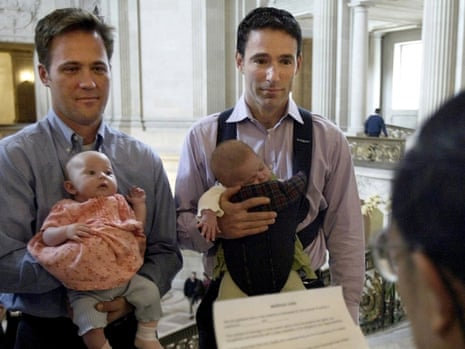A protracted child custody battle that allows a judge and a psychologist to determine whether you are friend or foe to your kids is every divorcing parent's nightmare. But for some gay and lesbian parents, that nightmare is a reality – and the deciding factor is too often the very fact of their sexuality.
That fear remains even when the law is supposed to protect gay parents. A friend – a gay dad in Texas – recently told me about his journey after he and his ex-wife had a legal agreement for 50-50 custody of their three children. But when his ex-wife decided to move far away and wanted to give him alternate weekend visits, "which she had no right to do," a lawyer bluntly told my friend:
You're in Texas. She's a straight female ... you're a single gay man ... you have to go on offense, just to keep the 50-50 time you already have with your kids.
He did, and it was extremely costly. But millions of gay and lesbian parents – those living in the 33 states without marriage equality and even those in states with – don't have the economic means to constantly battle the implicit and explicit discrimination they face to prove what social science already knows: that their sexuality shouldn't be a factor in determining their fitness as parents. But a new study from Drexel University shows that it often is.
The results can be tragic for children: separating them from their gay or lesbian parents, and sometimes leaving them in unsafe homes simply because the other household is "straight".
This gap between what science tells us and the law dictates is examined in a fascinating new report from Drexel University psychology professor Kirk Heilbrun and PhD candidate Emily Haney-Caron, which examines the legal landscape for LGBT parents in relation to child custody.
By phone, Haney-Caron explained that she became interested in investigating the "forensic assessment" of how psychologists advise courts about what is in the best interests of a child with gay parents, because "there's nothing out there talking about [these] sub groups of families that might require a nuanced approach."
"It was important for psychologists to provide some background of what the law looks like, and to understand what the research looks like, and how these two should be coming together," Haney-Caron said, even though they often do not.
Haney-Caron and Dr Heilbrun wrote:
On the dissolution of a heterosexual relationship, a judge may find that the gay or lesbian parent's sexual orientation is relevant to determining the child's best interest, and, as a result, a lesbian or gay parent may not receive custody.
That all comes despite something social science research has been able to tell us pretty consistently: being a gay or lesbian parent doesn't have much effect on how your kids turn out.
For years, study after study has found that whether a child is raised by heterosexual or homosexual parents, there isn't a significant difference in their well-being. The largest of these studies, published last year by Melbourne University in Australia, suggests that children raised in queer households might even be doing better than their poor peers saddled with straight parents.
There exists no empirical evidence to back up any psychologist's – the professionals most often charged by divorce courts with assessing which parent's home will be best for a child in custody disputes – belief that being raised by a gay dad or lesbian mom would automatically be detrimental to the child. And yet, too often, courts and legislatures make that false assumption.
Perhaps the most egregious example of this is the 1999 case of David Weigand, a gay father who sued for custody of his son after the teenager called 911 to report his stepfather had threatened to kill him and his mother. The Mississippi Supreme Court ruled, six-to-three, that the minor should stay in the straight household, no matter how violent. Rather than live in a home with two men, the dissent wrote:
The majority believes a minor is best served by living in an explosive environment in which the unemployed stepfather is a convicted felon, drinker, drug-taker, adulterer, wife-beater, and child-threatener.
The Weigand ruling happened long ago – before any states legalized same-sex marriage, before the Supreme Court repealed Section 3 of the Defense of Marriage Act in Windsor v. The United States. But discrimination against gay and lesbian parents is still enshrined in law: in individual judge's opinions, in case law history, and in legislation itself. As the Drexel report notes, Section 3 only addressed a very specific aspect of DOMA, and Windsor "does not change the legal landscape regarding custody involving lesbian or gay parents."
But in states like Texas, sodomy laws have even been used to make every gay parent (every gay person, really) a criminal. Until Lawrence v Texas, it was legally justified for courts to deny a gay parent custody because any practicing gay person was considered a criminal sodomite. Lawrence made such laws unconstitutional, but they're still on the books in Texas, making a comeback in Louisiana, and contributing toward a legal climate of fear that leaves gay parents living in a state of constant worry.
The answer to the conundrum, Haney-Caron and Dr Heilbrun wrote, lies not just in getting the courts to acknowledge science, but in getting statehouses to "develop legislation to limit judicial consideration of sexual orientation in custody decisions," for "[s]uch policy changes would have the potential to assist judges in the complex decisions they are asked to make regarding custody and parental rights – and could help ensure that such legal decisions genuinely reflect the best interest of the child."

